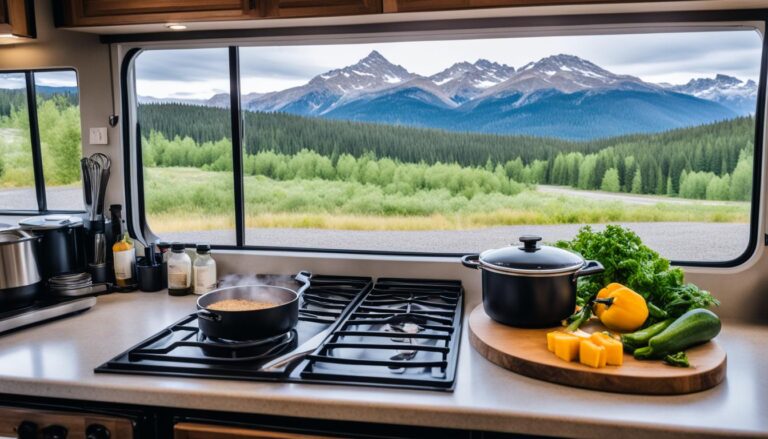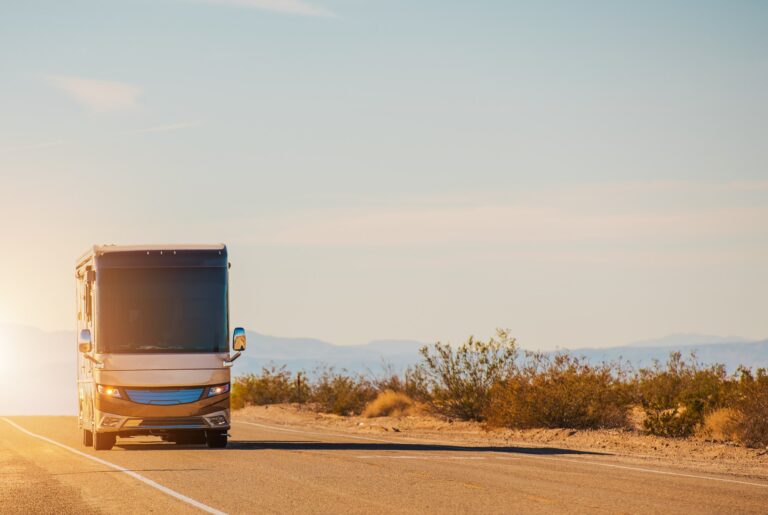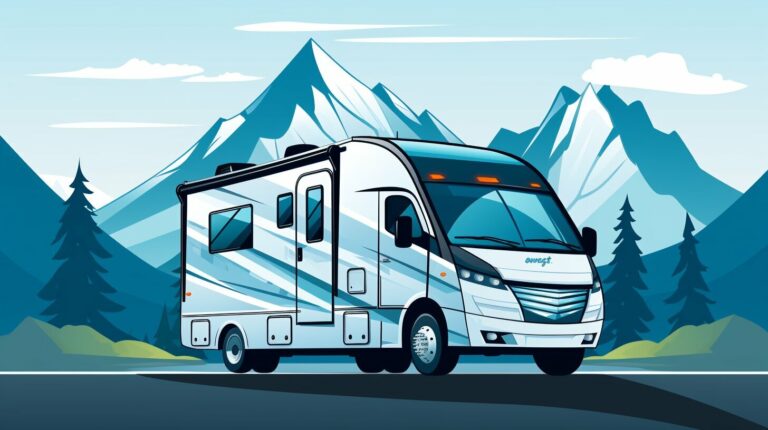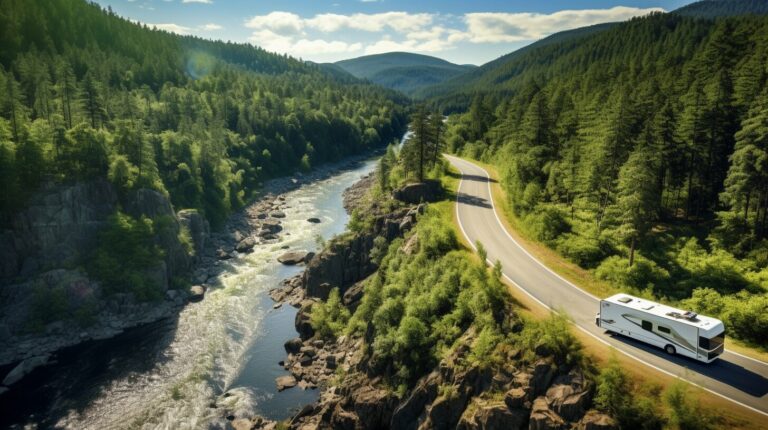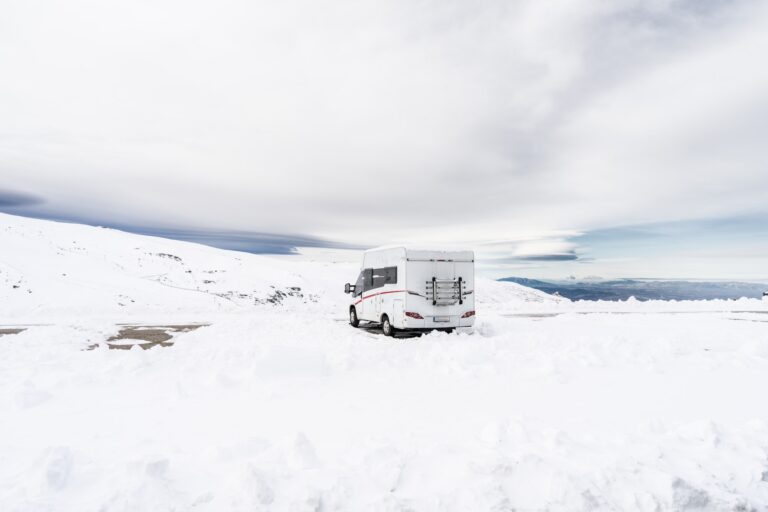Starting an RV adventure needs thought. You want to pick the best RV that fits your traveling needs and style. This guide will help you, whether you’re eyeing a plush motorhome or a roomy travel trailer.
Key Takeaways
- Know the different RV types – motorhomes, travel trailers, and fifth wheels – to see what works best for you.
- Think about how you travel, your group size, and storage needs. Look for an RV that’s spacious yet cozy.
- Consider the costs, both upfront and long-term, and whether you’ll need to tow or drive it. This will keep you on budget.
- Look into reliable RV makers and their customer services. This helps in making a smart buy.
- Always test drive and closely check any RV you’re thinking of buying. This ensures you’ll choose wisely.
Understanding the Different RV Types
Choosing the right RV for your adventures is important. There are different types, each with its own appeal. The main RV categories include motorhomes, travel trailers, and fifth wheels.
Motorhomes
Motorhomes are like a home on wheels, built on a truck or van. They offer all sizes, from small to really big. With motorhome features that suit you, they combine driving and living space into one. This means you can easily move around and start your camp without towing more.
Travel Trailers
Travel trailers are a great option if you like to tow your living space. They vary in size and type to meet your needs. You can find lightweight ones that you can tow with your car. They range from tiny to quite roomy, fitting different towing and living requirements. This gives you the freedom to pick what suits you best.
Fifth Wheels
Now, fifth wheels are a different kind, made to be connected to a pickup truck’s hitch. This setup means more stability, living area, and nice fifth wheel layout designs. They are a favorite for those looking for a larger, more luxurious towing experience.
Laying out the details of each RV type is crucial. Knowing their special benefits can guide your choice. Think about the size, what’s inside, and how you’ll tow it. This will help you decide which RV is just right for you. So, choose wisely and get ready to explore in just the RV you need.
Assessing Your Travel Needs and Lifestyle
Before picking the perfect RV, take time to know your travel habits and what you need. By doing this, you’ll find the RV that fits your wants and needs.
Think about who will be traveling with you. This affects how many people the RV can sleep and its size. Also, decide if you’ll take short weekend trips or longer vacations. This choice affects the RV’s features and comfort level you need.
Think about where you’ll go with your RV. Will you stay in campgrounds or go off-road to wild places? The places you plan to visit will affect what features your RV should have.
- Consider the size of your family or travel group
- Evaluate the duration and frequency of your travels
- Determine the types of destinations you plan to visit
By looking into your travel needs, planning well, and knowing how you’ll use the RV, you’re on the right path. This approach helps you choose an RV that will improve your adventures and meet your comfort and convenience standards.
“The right RV can transform your travels, turning every journey into an unforgettable experience.”
How to Choose the Right RV for You
Choosing the right recreational vehicle (RV) is a key decision for great camping trips. Think about the size you need and the amenities that fit your lifestyle. This way, your RV will feel like your perfect travel home.
Determining the Right Size
Finding the best RV size depends on your travel group and space needs. Think about how many people will sleep in it and the storage for your gear. Also, consider if the RV size will be easy to drive and park. You should think about:
- Sleeping capacity: How many people will sleep in the RV?
- Storage needs: Is there enough room for your clothes and gear?
- Maneuverability: Can you easily drive and park the RV?
Choosing the right floor plan is important for both comfort and convenience.
Evaluating Amenities and Layouts
The features you select will impact your camping comfort a lot. Think about the kitchen and bathroom arrangements. Every small detail helps your RV feel like a real home. Consider questions like:
- Are you fine with a small kitchen, or must it have an oven?
- Do you need a separate bedroom or will a convertible area do?
- Do you prefer a big shower, or is a smaller one okay?
Choosing the amenities that matter most to you will lead you to an RV that suits your lifestyle well.
| RV Size Considerations | RV Amenity Preferences |
|---|---|
|
|
“The right RV can transform your camping adventures, providing the perfect blend of comfort, convenience, and adventure.”
Thinking about rv size selection, rv floor plan considerations, and rv amenities and features is crucial. This will ensure you pick an RV that makes your trips memorable.
Budgeting Considerations
Buying an RV is a big financial step, so it’s vital to plan ahead. Here, you’ll learn about the costs to expect – both at the start and ongoing. We’ll also look into ways to finance your RV wisely.
Upfront Costs
When you buy an RV, the first big expense is the price tag. The cost can be from tens of thousands to hundreds of thousands of dollars. This depends on the size, features, and brand you choose. And don’t forget to include any upgrades.
Don’t overlook these initial expenses:
- Taxes and registration fees
- First year’s insurance premiums
- Inspection and any pre-delivery maintenance
- Personalizing accessories and equipment
Ongoing Expenses
After buying your RV, plan for the continuing costs. These may include:
- Various insurance types
- Regular maintenance and repairs
- Fuel for the engine and the generator when off-grid
- Storage or parking costs when it’s not on the road
- Fees for campgrounds or RV parks on your trips
Looking into RV financing options like loans or leases can be a smart move. It can make managing these ongoing costs easier. As we explore these choices, remember to think about their long-term effects on your finances and lifestyle.
“RV ownership is an investment, but with proper planning and budgeting, it can be an incredibly rewarding experience. Understanding the upfront and ongoing costs is key to ensuring a smooth and enjoyable RV lifestyle.”
Towing and Driving Requirements
When you’re picking out an RV, think about how it’ll need to be towed. The RV’s weight, length, and height and your vehicle’s ability to tow are very important. They make sure your trip is both safe and comfortable.
It’s key to know the technical stuff about your RV and towing vehicle. This info helps you avoid problems on the road. It makes your travel in the RV smooth and fun.
RV Weight and Dimensions
The RV’s weight and size can change your driving and towing adventure. The GVWR tells you how much your RV, stuff in it, and passengers weigh. This helps you know your towing vehicle’s requirements. The RV’s length and height could affect how easy it is to move, its gas use, and getting through certain places.
Towing Capacity
Your vehicle’s towing limit is crucial when you’re RV shopping. It tells you the heaviest RV your vehicle can safely pull. Be sure your RV doesn’t weigh more than this. Going over this limit can cause handling problems and be unsafe.
| RV Type | Typical GVWR Range | Typical Towing Capacity Range |
|---|---|---|
| Motorhome | 8,000 – 30,000 lbs | N/A (self-powered) |
| Travel Trailer | 3,000 – 12,000 lbs | 3,500 – 12,000 lbs |
| Fifth Wheel | 8,000 – 16,000 lbs | 8,000 – 16,000 lbs |
Think about the rv towing capacity, rv weight and dimensions, and your vehicle’s strength. This prepares you for a fun and secure RV trip.
“The perfect combination of an RV and towing vehicle is vital for a great, worry-free trip. Knowing the tech details helps you pick what’s right for you.”
Keep in mind, details like RV weight, size, and height can hugely impact your RV journey. By wisely matching your RV and towing vehicle, you’ll begin your RV explorations feeling ready and relaxed.
Exploring Recreational Vehicle Brands
Choosing the right RV involves looking into the brands’ reputation, quality, and service. There are many RV makers, each with unique features. Examining these aspects helps you find an RV that fits your needs. This ensures a great experience with your RV.
Reputation and Quality
The reputation and quality of an RV brand are key to your satisfaction. Checking customer reviews, ratings, and the brand’s innovation shows the quality of their products. You want to choose makers known for durable and reliable RVs.
- Examine customer reviews and ratings to gauge real-world experiences with the brand’s RVs.
- Investigate the manufacturer’s approach to quality control and commitment to continuous improvement.
- Consider the brand’s reputation for innovation, as this can indicate their dedication to staying ahead of the curve and meeting evolving customer needs.
Customer Service and Support
The customer service a brand offers is very important. Look into the warranty, support, and how well they respond to issues. A brand with good customer support ensures a smoother ownership experience.
- Evaluate the brand’s warranty policies and the scope of coverage they offer.
- Explore the availability and accessibility of customer service channels, such as dedicated helplines, online resources, and local service centers.
- Assess the brand’s reputation for addressing customer issues and providing prompt, effective solutions.
Researching the brand’s reputation, quality, and customer service is crucial. Making an informed choice leads to a better RV life. Compare and research to find the best RV brand for you.
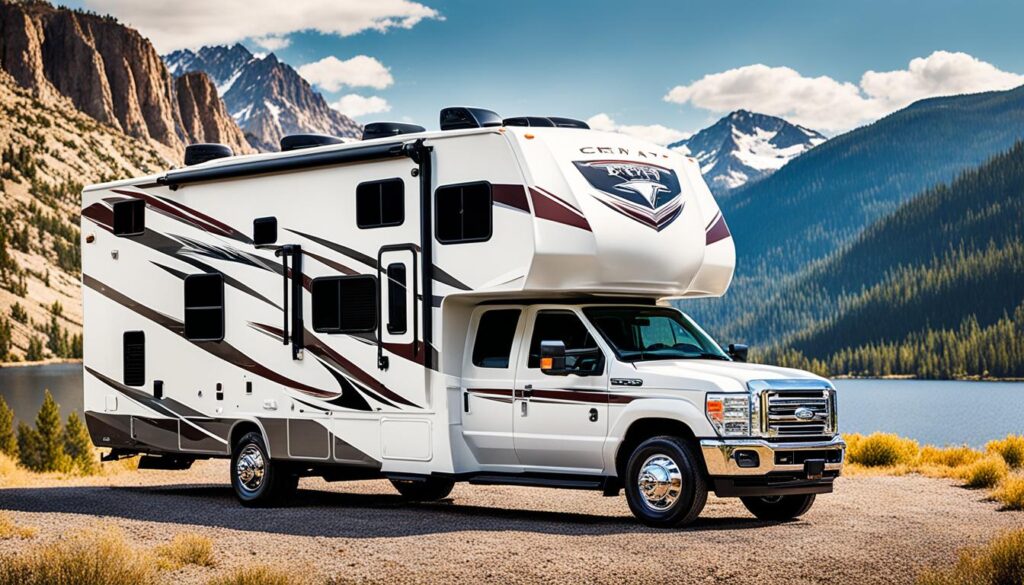
“An RV is more than just a vehicle; it’s a gateway to a lifestyle of adventure and exploration. Choosing the right brand can make all the difference in your journey.”
Buying New vs. Used RVs
Deciding on a new or used RV is a big step when buying a recreational vehicle. Each choice has its benefits. Knowing these can guide you to the right one for your desires and wallet.
New RVs: The Latest Features and Technologies
A brand-new RV means you get the newest features, designs, and technology. New RVs boast top safety measures, better gas mileage, and the latest luxuries that make trips even better. Yet, being the first to enjoy them costs more at the start.
Used RVs: Affordable Alternatives
Opting for a used RV is a smart move for budget-conscious RV lovers. You can save thanks to a smaller initial investment. They offer value for money. However, it’s important to check a used RV well to insure it’s reliable. Also, to comprehend how much its worth may decrease as time goes on.
| Considerations | New RV | Used RV |
|---|---|---|
| Cost | Higher upfront cost | Lower initial investment |
| Features and Technology | Latest amenities and innovations | May lack some modern features |
| Depreciation | Significant depreciation in the first few years | Lower depreciation, but still present |
| Condition and Reliability | Assured quality and warranty protection | Requires thorough inspection and research |
Choosing between a new RV vs. used RV hinges on what you value. Look closely at what you need for travel, your preferences, and your budget. This will lead you to a decision that fits your RV plans and way of living well.
“Purchasing a used RV can be a great way to save money, but it’s essential to do your research and thoroughly inspect the vehicle before making a decision.”
Test Driving and Inspecting RVs
Before you wrap up your RV buy, checking and test driving it is vital. This step will give you the right feeling to decide well. It also ensures the RV fits your life. Let’s look at the important steps for checking out your future RV.
Pre-Delivery Inspections
Doing a RV inspection checklist before picking up your new RV is key. It’s the time to spot and handle any issues with the seller. Carefully look over the RV inside and outside. Use a detailed checklist to make sure it all works well.
- Thoroughly inspect the exterior for any signs of damage, leaks, or potential problems.
- Check the interior for cleanliness, functionality of appliances, and overall condition.
- Test all electrical, plumbing, and mechanical systems to ensure they are operating correctly.
- Verify the RV’s weight and ensure it matches the specifications provided.
- Review the RV’s documentation, including the owner’s manual, warranty information, and service records.
Test Driving Tips
After your pre-buy checks, it’s time for the test drive. This step is crucial. It helps you see how the RV runs, moves, and fits your needs.
- Choose a route with different road types to test the RV well.
- Focus on the steering, brakes, how it speeds up, and reacts on the road.
- Check how easy it is to move, especially in tight or backing up situations.
- Make sure everything works, like the fridge and AC, and check for fun system issues.
- Note any strange sounds or feelings during the drive.
Following these steps well gives you a full picture of the RV. This info helps you make a smart choice about buying it.
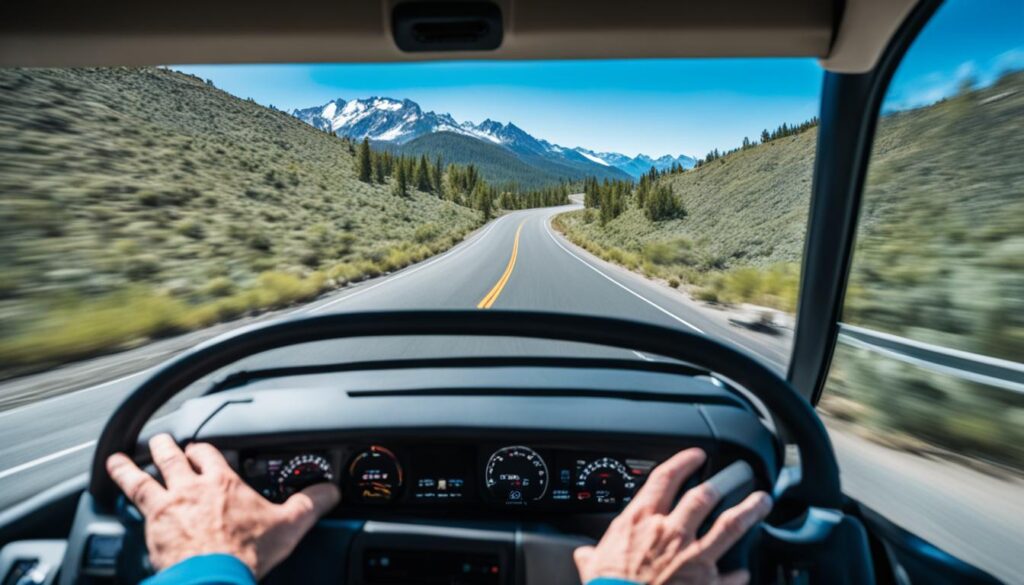
| Key Considerations | Importance |
|---|---|
| Pre-Delivery Inspection | Identifies potential issues before purchase |
| Thorough Test Drive | Evaluates RV’s handling and performance |
| Comprehensive Checklist | Ensures a complete and detailed evaluation |
“Taking the time to thoroughly inspect and test drive an RV is one of the best investments you can make to ensure a smooth and enjoyable ownership experience.”
RV Lifestyle Considerations
Embracing the RV lifestyle opens up a world of exciting possibilities. You can find scenic campgrounds and meet fellow RV enthusiasts. There’s lots to explore and experience as you start your RV journey.
Campground Options
RV camping lets you dive into different, beautiful campgrounds. You might love quiet, wild spots or ones with all the amenities. Do some research to find the perfect spot for your RV adventures.
- National and state parks: Offering breathtaking natural surroundings and often more rustic accommodations.
- RV resorts and campgrounds: Providing a wide range of amenities, from full hookups to recreational activities.
- Boondocking and dry camping: Allowing you to experience the great outdoors with minimal infrastructure.
RV Community and Resources
The RV lifestyle comes with a lively community. This includes local clubs, online forums, and social media groups. Joining these can offer you tips, help with fixing your RV, and new friends.
| RV Community Resource | Benefits |
|---|---|
| RV clubs and meetups | Opportunities to socialize, share experiences, and learn from fellow RV owners. |
| Online forums and groups | Access to a wealth of information, advice, and support from the RV community. |
| RV-focused blogs and websites | Valuable resources for RV lifestyle tips, maintenance, and travel inspiration. |
Fully embracing the RV community and its resources can greatly improve your RV lifestyle. It helps you enjoy RV camping more and makes the most out of your experiences.
“The RV lifestyle is all about freedom, adventure, and connecting with the great outdoors. Embrace the journey and make the most of every mile.”
Conclusion
Now, you’re ready to pick the ideal recreational vehicle for your adventures. The right RV opens adventures in new places and helps you create lasting memories.
Finding the perfect RV is key for your lifestyle and travel plans. With good info and research, starting your RV journey is smooth. Enjoy your time exploring!
This guide offers all you need to choose well. Be it a motorhome, travel trailer, or fifth wheel, start your RV life. The road is yours, enjoy the journey!

